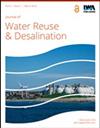Economic and environmental assessment of water reuse in industrial parks: case study based on a Model Industrial Park
IF 2.3
Q2 Environmental Science
引用次数: 8
Abstract
Industrial wastewater reuse is a major measure to mitigate the depletion of available freshwater resources in the catchments around industrial areas and to prevent possible future water shortages and the resulting problems for industry, economy and society. Combining a set of environmental aspects and economic aspects of different wastewater treatment technologies, the authors developed a model-based approach for planning and evaluating water reuse concepts in industrial parks. This paper is based on an exemplary Model Industrial Park. The results based on data primarily calculated for Germany show that, for the majority of the indicators, the installation of the Water Reuse Plant seems to be beneficial for all examined reuse options. Considering the economic dimension, due to economies of scale, reuse options with larger volumes of treated water are preferable since the costs per m3 of reuse water are reduced by up to 33%. On the other hand, the environmentally preferable option depends on the respective indicator, e.g. for freshwater eutrophication, the higher the reuse factor, the lower the impact, leading to reductions between 8 and 12%. For climate change, the best option is dependent on the reuse purpose leading to reductions between 8 and 52%.工业园区中水回用的经济与环境评价——以示范工业园区为例
工业废水回用是缓解工业区周围集水区可用淡水资源枯竭的一项主要措施,也是防止未来可能出现的水资源短缺以及由此给工业、经济和社会带来的问题的一项重要措施。结合不同废水处理技术的一系列环境方面和经济方面,作者开发了一种基于模型的方法来规划和评估工业园区的水再利用概念。本文以示范工业园区为研究对象。根据主要为德国计算的数据得出的结果表明,就大多数指标而言,安装水再利用厂似乎对所有已审查的再利用方案都有利。考虑到经济方面,由于规模经济,具有较大处理水量的再利用方案是优选的,因为每立方米再利用水的成本可降低33%。另一方面,对环境有利的选择取决于各自的指标,例如,对于淡水富营养化,再利用系数越高,影响越低,导致减少8%至12%。对于气候变化,最佳选择取决于重复使用的目的,从而减少8%至52%。
本文章由计算机程序翻译,如有差异,请以英文原文为准。
求助全文
约1分钟内获得全文
求助全文
来源期刊

Journal of Water Reuse and Desalination
ENGINEERING, ENVIRONMENTAL-WATER RESOURCES
CiteScore
4.30
自引率
0.00%
发文量
23
审稿时长
16 weeks
期刊介绍:
Journal of Water Reuse and Desalination publishes refereed review articles, theoretical and experimental research papers, new findings and issues of unplanned and planned reuse. The journal welcomes contributions from developing and developed countries.
 求助内容:
求助内容: 应助结果提醒方式:
应助结果提醒方式:


